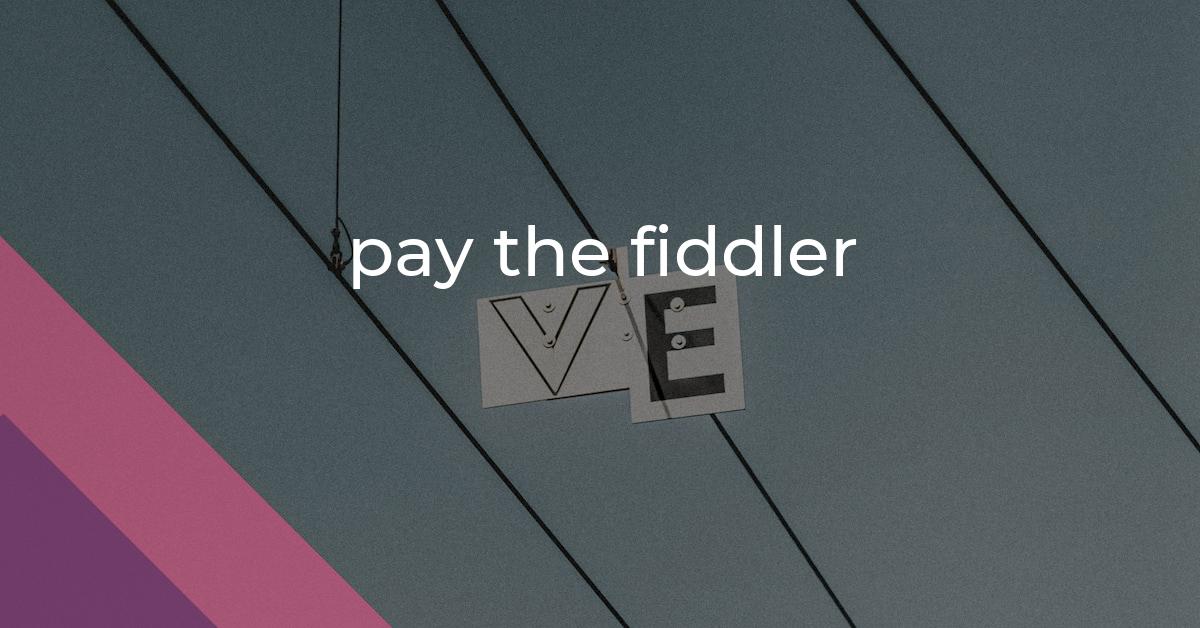pay the fiddler: Idiom Meaning and Origin
What does ‘pay the fiddler’ mean?
When you have to face the negative consequences of your actions or decisions, it means you have to "pay the fiddler." This idiom suggests that you must take responsibility for the outcome, even if it is unpleasant or costly.

Idiom Explorer
The idiom "rod in pickle" means being in a difficult or troublesome situation, often due to one's own actions or choices.
The idiom "rod for one's back" means a self-imposed burden or problem that one creates for themselves by their own actions or choices.
The idiom "rob Peter to pay Paul" means to take something away from one person or thing to give it to another, especially when both parties are negatively affected by the transaction.
The idiom "reap what one sows" means that a person will face the consequences of their actions, whether positive or negative.
The idiom "reap the whirlwind" means to face the negative consequences of one's actions or decisions, especially when they involve anger, violence, or aggression.
The idiom "pick up the tab" means to pay the bill or expenses for a group of people or oneself, often in a social or business setting.
The idiom "pay through the nose" means to pay a very high price for something, often more than is considered fair or reasonable.
The idiom "pay the rent" means to meet one's financial obligations or responsibilities, especially in regard to sustaining one's livelihood or meeting basic needs. It implies fulfilling necessary obligations in order to maintain stability, similar to paying the bills or supporting oneself.
The idiom "pay the piper" means to suffer the negative consequences or face the payment of a debt or obligation that has been incurred, typically as a result of one's own actions or choices.
The idiomatic phrase "pay the freight" means to bear the cost or responsibility for something. It is often used to convey the idea of taking on the financial burden or accountability for a particular situation or outcome.
Musical Obligation
devil went down to Georgia, he was lookin' for a soul to steal. He was in a bind 'cos he was way behind, he was willin' to make a deal..." The song goes on to tell the story of a fiddling contest between the devil and a young boy named Johnny. In this song, the theme of "pay the fiddler" is explored through the consequences that the devil faces for challenging Johnny to a fiddling duel.
Another related idiom is "pay the piper," which has a similar meaning to "pay the fiddler." This idiom also references the consequences or price one must pay for their actions. It originated from the story of the Pied Piper of Hamelin, a folk tale in which the pied piper is hired to rid the town of rats. When the townspeople refuse to pay the piper for his services, he retaliates by leading all the children of Hamelin away. In this story, the piper symbolizes the need to honor commitments and fulfill obligations. The idiom "pay the piper" can be used interchangeably with "pay the fiddler" to convey the same message.
A third related idiom is "hell to pay," which means to face serious consequences or to be in a lot of trouble. This idiom is often used to describe a situation where the negative outcome or punishment is particularly severe. The phrase "hell to pay" suggests that the consequences of one's actions or decisions are so significant that they will be difficult to avoid or escape. Like "pay the fiddler," this idiom emphasizes the idea that actions have repercussions and that one must face the music.
The idiom "pay the fiddler" has its origins in Irish and Scottish folklore and is derived from the practice of compensating a fiddler for their services. It conveys the idea that one cannot enjoy the benefits or pleasures without accepting the responsibilities or consequences that come with them. This idiom is closely related to the idioms "pay the piper" and "hell to pay," which also emphasize the need to face the consequences of one's actions. These idioms serve as reminders that indulgence or reckless behavior will eventually result in negative outcomes or punishment. So, remember to consider the price to pay before making decisions and be prepared to face the music.
Example usage
1. After secretly using her mother's credit card for years, Linda finally had to pay the fiddler when her mother discovered the unauthorized charges.
2. The company's CEO was known for his extravagant spending, but when the business started to go bankrupt, he had to pay the fiddler and face the consequences of his reckless behavior.
3. John's irresponsible financial decisions caught up with him when he couldn't pay his bills anymore. It was time for him to pay the fiddler and take responsibility for his actions.
More "Finance" idioms



